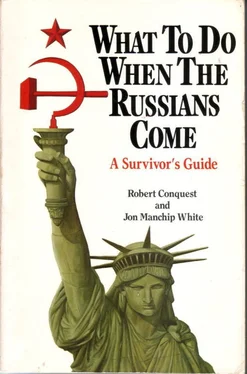Robert Conquest - What to Do When the Russians Come
Здесь есть возможность читать онлайн «Robert Conquest - What to Do When the Russians Come» весь текст электронной книги совершенно бесплатно (целиком полную версию без сокращений). В некоторых случаях можно слушать аудио, скачать через торрент в формате fb2 и присутствует краткое содержание. Город: New York, Год выпуска: 1984, ISBN: 1984, Издательство: Stein and Day Inc., Жанр: Публицистика, на английском языке. Описание произведения, (предисловие) а так же отзывы посетителей доступны на портале библиотеки ЛибКат.
- Название:What to Do When the Russians Come
- Автор:
- Издательство:Stein and Day Inc.
- Жанр:
- Год:1984
- Город:New York
- ISBN:0-8128-2985-9
- Рейтинг книги:3 / 5. Голосов: 1
-
Избранное:Добавить в избранное
- Отзывы:
-
Ваша оценка:
- 60
- 1
- 2
- 3
- 4
- 5
What to Do When the Russians Come: краткое содержание, описание и аннотация
Предлагаем к чтению аннотацию, описание, краткое содержание или предисловие (зависит от того, что написал сам автор книги «What to Do When the Russians Come»). Если вы не нашли необходимую информацию о книге — напишите в комментариях, мы постараемся отыскать её.
What to Do When the Russians Come — читать онлайн бесплатно полную книгу (весь текст) целиком
Ниже представлен текст книги, разбитый по страницам. Система сохранения места последней прочитанной страницы, позволяет с удобством читать онлайн бесплатно книгу «What to Do When the Russians Come», без необходимости каждый раз заново искать на чём Вы остановились. Поставьте закладку, и сможете в любой момент перейти на страницу, на которой закончили чтение.
Интервал:
Закладка:
Indian (Native American)
The Communists will make what use they can of Indians and the Indian movements, although they will not have the priority given to the more numerous black and Chicano elements.
The reservations, probably renamed “autonomous areas.” will be maintained, but the inhabitants will have no right to the oil and other resources in them, which will be the property of the State. And there will no longer be any bar to white or other settlers. The Indians will become citizens, although of course, the advantages of citizenship will be few. A few select Indians will be given impressive-looking posts, largely of a cosmetic nature; for example, there will be an Indian commissioner for native American affairs together with a number of Congressmen of the new style.
Indian organizations will be purged of any independent elements of leadership. As the record of the tribes and many subgroups in the Soviet Union shows, it will be difficult to find any Indians who are real Communists, or even near-Communists, to be heads of the administration of the autonomous areas; the Communists will have to make do with supervision by unobtrusive white “advisers.” Indian languages, dances, customs, and folkways will be encouraged but guided into the desired channels. For example, new “folk songs” will be required, extolling the virtues of communism. At the same time, as elsewhere, Indians will be forced into collective farms. Those who live a mobile existence, such as the Navajo, will be compelled to settle.
In general, the interests of the State economy will be put before those of the small peoples. A Soviet commentator has written of similar groups in areas in the mountains bordering China:
The present-day Khakassi living in the Khakass Autonomous Province are a minority in the national composition of Khakassia. The non-Khakassian population in Khakassia forms a majority and outnumbers the Khakassi several times. This has occurred during the last twenty years chiefly because the Khakassi, few in number, were not in a position to ensure the rapid development of a powerful industry having All-Union and All-State importance, for the establishment of which favourable local conditions exist. This is also applicable to the Shors… and the Altais of the High Altai Autonomous Province… It is difficult to say what will be the ultimate fate of each of the small ethnographic groups and peoples…
But not too difficult to guess; and for Khakass, Shor, Altai, read, in the American context, Navajo, Hopi, Apache.
In the Soviet Union, mountain and desert peoples like the Chechens and Kalmyks, resembling many of the Western Indians, were driven into a more desperate resistance than that of any section of the population; and several were among those later deported en masse (men, women and children) to Siberia, although some of these were later allowed to return.
Meanwhile, those of you who inhabit mountain or desert country will possess certain advantages in that it will be difficult to keep you under constant observation and control. Our advice is: Keep your more unassimilable customs and folkways as far out of sight as possible; take what you are given; do not be deceived by temporary advantages; and unless you are desperate, do not offer resistance. But you will be prepared, if you do become desperate, to revert to the guerrilla-type existence of your forefathers. You should be more successful than most.
Industrial Worker
In theory, you will be the bulwark of the new socialist America.
You and everyone else will read a vast amount of propaganda about your heroic efforts in industry, and about your devoted loyalty to the new “workers’ state.” Control of your organizations will be the major concern of the Communist party (see Trade Unionist ).
All this will have some slight advantages, up to a point. Over minor offenses, for example, you will be treated comparatively lightly. With major matters such as opposition to the regime, on the other hand, your status will count against you since you will have proved yourself a “traitor to your class.” After the needs and wishes of the new bureaucratic elite have been satisfied, your children will, in the first decade or so have preferential access to education and indoctrination.
You will find a good many changes in your work. Trade unions will be totally under Communist control, and while they will administer holiday and insurance funds, they will have no right to oppose the management. The basic rule to which everything else must cede is the fulfillment of the “plan.” Since this is allotted from Washington, it will often be unrealistic, and you will be forced to work a great deal of overtime, almost invariably without special payment—especially toward the end of each month.
You will be issued a “labor book” that will list your successive jobs, with each management’s comments on your reasons for being transferred, including censure.
It has been the industrial working class above all, in spite of the pretenses of the Communist party, which has been the backbone of resistance in the Communist lands; as in Plzeň and East Berlin in 1953, in Budapest and Poznan in 1956, in Gdansk and elsewhere in 1970, and finally in the great Polish Solidarity movement today—to name some major worker militancy in Soviet-controlled countries. And in the Soviet Union itself, huge worker outbreaks have taken place in the last couple of decades in places like Novocherkassk, Temir-Tau, Krivoy Rog, Dneprodzerzhinsk.
These are signs that the worker does not really do very well out of the system administered in his name. But they also show that in certain circumstances worker unrest can spearhead major revolt against the regime. It is notable that some of the most powerful outbursts, even in the USSR itself, have come when economic resentment has been linked with political resentment—some Soviet riots and strikes were touched off by economic suffering, others by workers’ resentment at their colleagues being jailed and beaten to death by the police. But the most powerful movements of all have taken place when worker resentment has been linked with national hatred of the Soviet occupier. You will probably find this to be the case in America.
Insurance Agent or Insurance Company Employee
Insurance companies will be immediately nationalized and their capital confiscated. Insurance will become a prerogative of the State or its subsidiary, the “Trade Unions,” and you may be employed in the State insurance organization.
Japanese American
If Japan has not been conquered, all Japanese Americans will be regarded as adherents of a hostile power. They will automatically be deported from the Hawaiian Islands, California, and the other Pacific states. This will remind the older among them of their fates in 1942, with the difference that similar deportations under Soviet rule have resulted in an average 30 percent death rate.
Jewish
Many Jewish groups will find themselves in immediate trouble for a wide variety of reasons. They may be capitalists or involved in non-Communist politics or, in the specifically Jewish context, be Zionists or rabbis. Even if you have not given offense in any of these respects, you will inevitably find yourself, if you are Jewish, in a paradoxical situation. As with every other “ethnic” group, there will be an effort to use your organizations over the transitional stage; yet, at the same time, you will automatically be more suspect than your Gentile equivalent. This even applies to the Jewish Communist, who will be regarded with more distrust than his Gentile comrade when it comes to sniffing out deviation. So, unless you are an exceptional creature who can be manipulated as a “show Jew” and as a docile “leader” of the Jewish community, your prospects are shaky. This is not to say that every Jew will be arrested (though such a plan does seem to have existed in the Soviet Union in 1953), or even that you will automatically lose your job; but it does mean that certain professions will be largely or wholly closed to you. The maintenance of your Jewish identity will be discouraged, the Hebrew language will be virtually banned, and while Yiddish will be permitted, no Yiddish theatres will be open and no Yiddish books will be printed, although a few small-circulation Yiddish Communist newspapers will probably survive. As for anti-Semites, they will, of course, provided they can pass muster on other grounds, be very welcome to the regime, particularly as propagandists.
Читать дальшеИнтервал:
Закладка:
Похожие книги на «What to Do When the Russians Come»
Представляем Вашему вниманию похожие книги на «What to Do When the Russians Come» списком для выбора. Мы отобрали схожую по названию и смыслу литературу в надежде предоставить читателям больше вариантов отыскать новые, интересные, ещё непрочитанные произведения.
Обсуждение, отзывы о книге «What to Do When the Russians Come» и просто собственные мнения читателей. Оставьте ваши комментарии, напишите, что Вы думаете о произведении, его смысле или главных героях. Укажите что конкретно понравилось, а что нет, и почему Вы так считаете.












